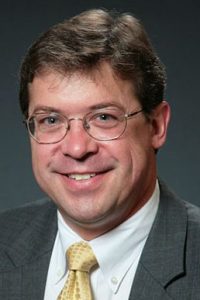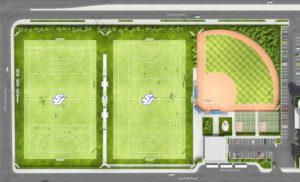James G. Rissler, President and CEO of the Presbyterian Church (USA) Investment and Loan Program, was recently named the new chair of the Spalding University Board of Trustees, and Tomarra Adams, a former program director and assistant dean at the University of Louisville, is now Spalding’s Dean for Undergraduate Education. They are among the new appointments and hires in leadership positions announced by the university for the 2018-19 academic year.
Rissler, who has been a Spalding trustee since 2012, will serve as board chair for two years. He has led PCUSA’s Investment and Loan Program since 2015 and before that served as the program’s Senior Vice President and Chief Operating Officer.
Rissler replaces Paul M. Ratterman, Managing Director of Fixed Income Institutional Sales at Stifel Financial, as the Spalding board chair after Ratterman served two two-year terms. Ratterman remains on the board.
Adams, Spalding’s new undergraduate dean, began work on Aug. 1. She was previously Director of Undergraduate Studies in the U of L Department of Pan-African Studies and an Assistant Dean in the College of Arts and Sciences with responsibilities in Advising and Student Services.

Adams, who was a tenured member of the U of L faculty, holds a PhD in social work jointly from U of L and the University of Kentucky. A licensed clinical social worker, she also holds a master’s degree in social work from U of L. Her undergraduate degree is in psychology with a minor in Pan-African studies.
“My passion has been to create space for students to be successful and be their advocate within higher education,” Adams said. “I have facilitated this passion through the lenses of Pan-African studies and social work – meeting students where they are while being committed to social justice and social responsibility. I am excited to be a part of the Spalding community, which embraces a mission centered on meeting the needs of a diverse body of students, impacting and engaging an urban community, and promoting peace and justice. It is uplifting to be among scholars and professionals who demonstrate this same passion in their own work every day and watch them make it a part of the fabric of the institution. I am inspired.”
Other faculty leadership positions that have been filled for 2018-19: Shannon Cambron, permanent chair of the Spalding School of Social Work after previously serving as acting chair; Stacy Deck, program director, bachelor of science in social work program; Pamela Elzy, program director, doctor of nursing practice program; Deborah Whistler, program director, bachelor of fine arts in studio art program; and Frederick Williams, a program director who has been hired to develop curriculum for a program in criminal justice studies with an emphasis on criminal justice reform.
New trustees on the Spalding board this year are: Mark B. Carter, Chief Executive Officer, Passport Health Plan; Christe S. Coe, a nurse practitioner who is a former member of the Kentucky Board of Nursing and Spalding’s 2018 Alumna of the Year; Pattie Dillon, the faculty trustee who is the chair of the Spalding School of Liberal Studies and an associate professor of history; Roger McClendon, who recently retired as Chief Sustainability Officer at Yum! Brands; and Eric Schwartz, Chief Investment Officer for Schulte Hospitality Group.
Spalding’s other board officers are: First Vice Chair James A. Morris, Vice President of Finance for Baptist Health Louisville and La Grange; Second Vice Chair Angela Leet, President of ALEETCO; and Secretary John P. Malloy, Vice President of Gas Distribution for Louisville Gas and Electric Company and Kentucky Utilities Company.


